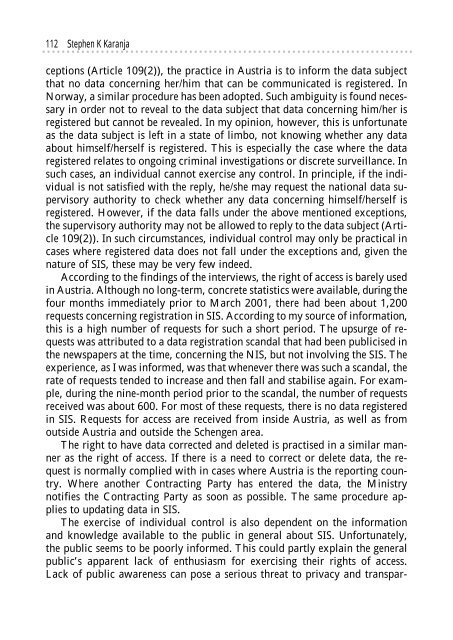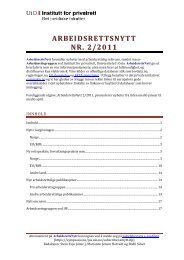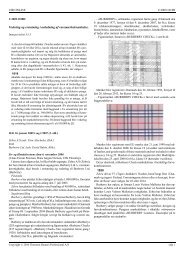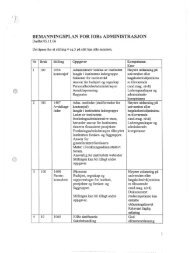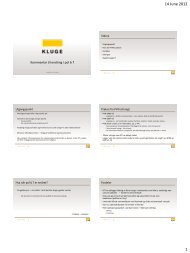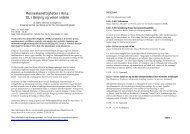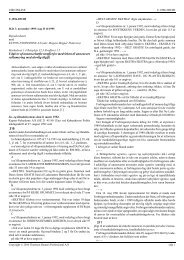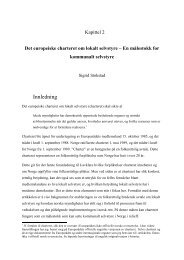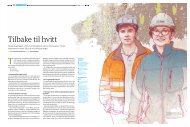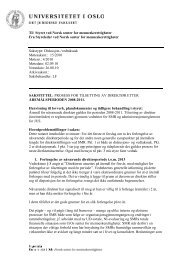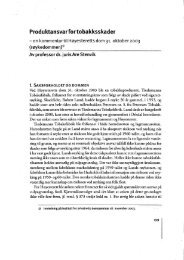Lee A. Bygrave (red.) YULEX 2002 - Universitetet i Oslo
Lee A. Bygrave (red.) YULEX 2002 - Universitetet i Oslo
Lee A. Bygrave (red.) YULEX 2002 - Universitetet i Oslo
Create successful ePaper yourself
Turn your PDF publications into a flip-book with our unique Google optimized e-Paper software.
............................................................................<br />
112 Stephen K Karanja<br />
ceptions (Article 109(2)), the practice in Austria is to inform the data subject<br />
that no data concerning her/him that can be communicated is registe<strong>red</strong>. In<br />
Norway, a similar procedure has been adopted. Such ambiguity is found necessary<br />
in order not to reveal to the data subject that data concerning him/her is<br />
registe<strong>red</strong> but cannot be revealed. In my opinion, however, this is unfortunate<br />
as the data subject is left in a state of limbo, not knowing whether any data<br />
about himself/herself is registe<strong>red</strong>. This is especially the case where the data<br />
registe<strong>red</strong> relates to ongoing criminal investigations or discrete surveillance. In<br />
such cases, an individual cannot exercise any control. In principle, if the individual<br />
is not satisfied with the reply, he/she may request the national data supervisory<br />
authority to check whether any data concerning himself/herself is<br />
registe<strong>red</strong>. However, if the data falls under the above mentioned exceptions,<br />
the supervisory authority may not be allowed to reply to the data subject (Article<br />
109(2)). In such circumstances, individual control may only be practical in<br />
cases where registe<strong>red</strong> data does not fall under the exceptions and, given the<br />
nature of SIS, these may be very few indeed.<br />
According to the findings of the interviews, the right of access is barely used<br />
in Austria. Although no long-term, concrete statistics were available, during the<br />
four months immediately prior to March 2001, there had been about 1,200<br />
requests concerning registration in SIS. According to my source of information,<br />
this is a high number of requests for such a short period. The upsurge of requests<br />
was attributed to a data registration scandal that had been publicised in<br />
the newspapers at the time, concerning the NIS, but not involving the SIS. The<br />
experience, as I was informed, was that whenever there was such a scandal, the<br />
rate of requests tended to increase and then fall and stabilise again. For example,<br />
during the nine-month period prior to the scandal, the number of requests<br />
received was about 600. For most of these requests, there is no data registe<strong>red</strong><br />
in SIS. Requests for access are received from inside Austria, as well as from<br />
outside Austria and outside the Schengen area.<br />
The right to have data corrected and deleted is practised in a similar manner<br />
as the right of access. If there is a need to correct or delete data, the request<br />
is normally complied with in cases where Austria is the reporting country.<br />
Where another Contracting Party has ente<strong>red</strong> the data, the Ministry<br />
notifies the Contracting Party as soon as possible. The same procedure applies<br />
to updating data in SIS.<br />
The exercise of individual control is also dependent on the information<br />
and knowledge available to the public in general about SIS. Unfortunately,<br />
the public seems to be poorly informed. This could partly explain the general<br />
public’s apparent lack of enthusiasm for exercising their rights of access.<br />
Lack of public awareness can pose a serious threat to privacy and transpar-


